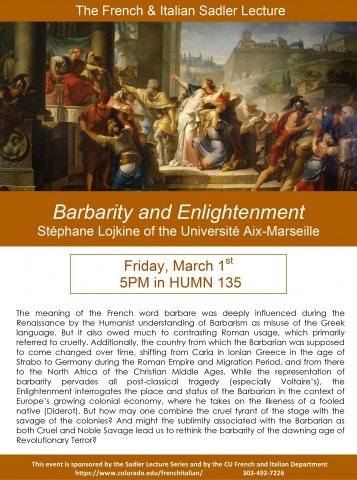
The French and Italian Sadler Lecture
5 p.m., Friday, March 1st
HUMN 135
University of Colorado, Boulder
About the talk
The meaning of the French word barbare was deeply influenced during the Renaissance by the Humanist understanding of Barbarism as misuse of the Greek language. But it also owed much to contrasting Roman usage, which primarily referred to cruelty. Additionally, the country from which the Barbarian was supposed to come changed over time, shifting from Caria in Ionian Greece during the age of Strabo to the Germany under Roman Empire and Migration Period, and from there to the North Africa of the Christian Middle Ages. While the representation of barbarity pervades all post-classical tragedy (especially Voltaire’s), the Enlightenment interrogates the place and status of the Barbarian in the context of Europe’s growing colonial economy, where he takes on the likeness of a fooled native (Diderot). But how may one combine the cruel tyrant of the stage with the savage of the colonies? And might the sublimity associated with the Barbarian as both Cruel and Noble Savage lead us to rethink the barbarity of the dawning age of Revolutionary Terror?
About the speaker
Stéphane Lojkine is a Professor of French Literature at the University of Aix-Marseille, member of the CIELAM research center. He specialized in Diderot studies and coordinates the Utpictura18 iconographic database. He wrote La Scène de roman, A. Colin, 2002 ; Image et subversion, Jacqueline Chambon, 2005 ; L’Œil révolté : Diderot, Salons, Jacqueline Chambon, 2007. He was at the initiative of the Diderot tricentennial exhibition Le Goût de Diderot, Montpellier and Lausanne, 2013-2014 (catalogue published by Hazan).
Sponsor
This event is sponsored by the Sadler Lecture Series and by the CU French and Italian Department.
